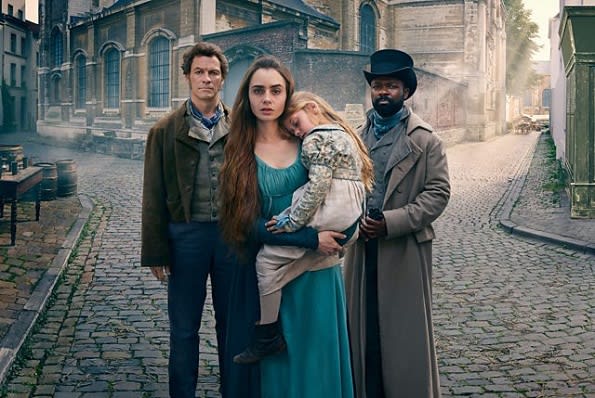BBC’s Les Misérables filmed Belgium as France
The BBC’s TV drama adaptation of Victor Hugo’s classic story Les Misérables largely used Belgian locations as stand-ins for its early-19th century French settings.
By Nick Goundry 8 Jan 2019

The BBC’s TV drama adaptation of Victor Hugo’s classic story Les Misérables largely used Belgian locations as stand-ins for its early-19th century French settings.
Produced by London-based Lookout Point, the BBC’s version of the story was directed by Tom Shankland using a script by Andrew Davies and does not involve any musical elements.
The drama stars Dominic West as Jean Valjean, David Oyelewo as Inspector Javert and Lily Collins as Fantine, while co-stars include Adeel Akhtar and Olivia Colman.
France has become a more film-friendly location for international producers since boosting its incentive support but the visuals of modern Paris can be a challenge for films and TV shows with period settings.
The BBC has experience doubling other parts of Europe for period Paris, with adventure series The Musketeers having built the French capital near Prague in the Czech Republic.
For Les Misérables, early 19th century Paris was recreated using a patchwork of visually-appropriate locations in and around historic parts of Brussels, in the nearby city of Ghent and in the French town of Sedan near the Belgian border.
“No one’s heard of Sedan, but it’s an unbelievably beautiful town with a massive old fort in the middle of it,” said producer Chris Carey, in comments to media outlet iNews.
“The people of Sedan were amazing. They let us caper about with hundreds of extras, shooting guns and firing cannons at all hours of the day and night.”

Location work in the Brussels region spanned nearly 30 of the overall 96-day filming schedule and involved €200,000 of investment from the Screen Brussels fund.
Producers also received €395,000 in funding from Screen Flanders and made use of Belgium's tax shelter financing.
The team worked locally with production company Czar Brussels.
Key locations included the city’s 17th century Flemish Baroque church Place du Béguinage and the 14th century priory Abbaye du Rouge-Cloître.
Filming also took place in two of the city’s key park locations, as well as in several private residences.
The producers made use of warehouse facilities in the city to store period props, costumes and production design materials.
Screen Brussels is a prolific investor in international co-productions and invites submissions for funding consideration three times a year. Features and TV series must commit to a minimum local spend of €250,000 to qualify for the support and funding is capped at €500,000 per production.
The last high-profile adaptation of Les Misérables was a big-budget 2012 film directed by Tom Hooper that featured singing unusually shot live with a cast led by Russell Crowe and Hugh Jackman. Hooper largely doubled UK locations for the story’s French settings and used Pinewood Studios as a base. The film went on to win multiple awards including three Oscars and four BAFTAs.
See KFTV's production guide for more on filming in Belgium.
Promo image: BBC/Lookout Point/Mitch Jenkins. BTS image: Screen Brussels
The drama stars Dominic West as Jean Valjean, David Oyelewo as Inspector Javert and Lily Collins as Fantine, while co-stars include Adeel Akhtar and Olivia Colman.
France has become a more film-friendly location for international producers since boosting its incentive support but the visuals of modern Paris can be a challenge for films and TV shows with period settings.
The BBC has experience doubling other parts of Europe for period Paris, with adventure series The Musketeers having built the French capital near Prague in the Czech Republic.
For Les Misérables, early 19th century Paris was recreated using a patchwork of visually-appropriate locations in and around historic parts of Brussels, in the nearby city of Ghent and in the French town of Sedan near the Belgian border.
“No one’s heard of Sedan, but it’s an unbelievably beautiful town with a massive old fort in the middle of it,” said producer Chris Carey, in comments to media outlet iNews.
“The people of Sedan were amazing. They let us caper about with hundreds of extras, shooting guns and firing cannons at all hours of the day and night.”

Location work in the Brussels region spanned nearly 30 of the overall 96-day filming schedule and involved €200,000 of investment from the Screen Brussels fund.
Producers also received €395,000 in funding from Screen Flanders and made use of Belgium's tax shelter financing.
The team worked locally with production company Czar Brussels.
Key locations included the city’s 17th century Flemish Baroque church Place du Béguinage and the 14th century priory Abbaye du Rouge-Cloître.
Filming also took place in two of the city’s key park locations, as well as in several private residences.
The producers made use of warehouse facilities in the city to store period props, costumes and production design materials.
Screen Brussels is a prolific investor in international co-productions and invites submissions for funding consideration three times a year. Features and TV series must commit to a minimum local spend of €250,000 to qualify for the support and funding is capped at €500,000 per production.
The last high-profile adaptation of Les Misérables was a big-budget 2012 film directed by Tom Hooper that featured singing unusually shot live with a cast led by Russell Crowe and Hugh Jackman. Hooper largely doubled UK locations for the story’s French settings and used Pinewood Studios as a base. The film went on to win multiple awards including three Oscars and four BAFTAs.
See KFTV's production guide for more on filming in Belgium.
Promo image: BBC/Lookout Point/Mitch Jenkins. BTS image: Screen Brussels
Latest news & features
Featured profiles
Promote your services with KFTV
Choose from three profile types - Basic, Silver and Gold
Create ProfileWe offer a range of display advertising opportunities.
Learn More